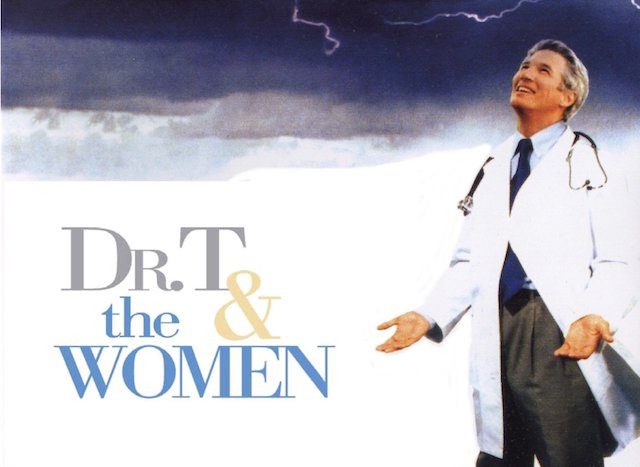
When movie critics get together, one of the topics we sometimes discuss, between junk-food binges and asthma attacks, is how much “homework” you need to do before reviewing a movie. If a film is based on a book, should you make a point of reading it first? If it’s a remake, should you watch the original? If it’s by a well-regarded director whom you’re not familiar with, must you seek out some of his earlier work?
The attitudes vary, and there’s no consensus, and only the most pretentious of critics would insist that their philosophies are the “right” ones that all must follow. You have to figure out what works best for you, sometimes on a case-by-case basis. And if anyone had told the 26-year-old me that my complete lack of experience with Robert Altman had hurt my review of his “Dr. T and the Women,” I’d have ridiculed that person for presuming to tell me how to do my job. But looking back on it now, I can see that this hypothetical person would have been right, and I would have to apologize, hypothetically.
I’d never seen a Robert Altman film before “Dr. T and the Women.” I was aware of his prestige for movies like “Nashville,” “MASH,” and “The Player,” but I hadn’t seen any of them, nor did I feel compelled to do any catching up before watching “Dr. T.” My attitude was, hey, something has to be my first Altman. Might as well start with his latest.
That attitude is fine. I stand by it. Where I made my mistake was in failing to acknowledge that being unfamiliar with Altman’s style was bound to affect my view of his new film, in the same way that my first trip to New York City was different from the subsequent ones. And I didn’t just fail to acknowledge this — I failed to realize it. I don’t think it ever occurred to me while I was ranting about how tedious and stupid and pointless “Dr. T” was that maybe I was missing something. Maybe it would make more sense in the context of Altman’s other work. Maybe the things about New York City that annoy or terrify you on your first visit become more tolerable — even charming! — thereafter.
To be clear, the opinion of someone who’s never seen an Altman film is as valid as anyone else’s. To readers who were also Altman novices, my review probably would have been more useful than one written by an expert. We’d have been coming from the same place. Trouble is, my review didn’t say what place I was coming from. When you’re reading a review of an acclaimed director’s new film, it’s reasonable to wonder about the critic’s stance on the director’s other work. If I’d mentioned at some point that this was my first Altman, the readers who were familiar with him and wanted to know how “Dr. T” fit with everything else would have known that I wasn’t going to be much help. But I didn’t give them that. I avoided saying anything that would give me away as a newbie.
What I said then:
“‘Dr. T and the Women’ takes the viewer through several emotions. First you wait patiently, perhaps smilingly, as things start to get underway and the general tone is one of humor and whimsy. Then you get bored when you realize you’re well into the film and still nothing has happened. Then you get angry at the thought that the movie seems to be doing this on purpose, intentionally taunting you with misogyny, sexism and sheer thundering dullness. Finally, you’re furious at the film’s stupid, nauseating ending, and you storm out of the theater with your fists clenched, hoping that director Robert Altman is making a surprise personal appearance at your local multiplex so you can punch him in the face…. The simple fact is, this is a movie where nothing happens. Altman allows his actors to improvise, which in this case was a bad idea…. Anne Rapp’s script … downplays the actual plot points and gives more time to people sitting around talking about boring things…. There is never anything in the film to make you want to keep watching it…. But the infuriating thing is, this pretentious piece of garbage actually thinks you WILL want to watch it! The movie is completely satisfied with itself, entirely confident in its merits, which aren’t there.” Grade: F [complete review]
Lest you think the issue of having seen or not having seen other Altman movies is irrelevant here, let me quote another part of my review:
“It’s one thing for a film to be bad and be quiet about it. But when it’s touted as a ROBERT ALTMAN FILM! with an ALL-STAR CAST!, it sets a higher standard for itself — a standard that, in this case, it utterly fails to live up to.”
Am I saying “Dr. T” doesn’t meet the standard of quality set by other Altman movies? A reader could definitely get that impression. But that can’t be what I meant. I hadn’t seen any others.
No, my point of view was even narrower than that. I knew Altman was supposed to be a great filmmaker, and I knew I hated “Dr. T.” Therefore I concluded that it was a disappointment — a disappointment in comparison to the brilliance of Altman as it had been described to me by other people. I was basically comparing “Dr. T” to the version of Robert Altman that existed in my head. I allowed for the possibility that his other films were better than this one, but I didn’t consider the possibility that not having seen any of them would put me at a disadvantage.
The re-viewing:
I’ve watched and written about several Altman films since then, some more than once. There are still gaps in my education, but I feel like I have a decent grasp of how Altman generally worked — generally — what his methods were, how he told stories.
And I’m not gonna lie to you: It generally isn’t my cup of tea. I usually find myself respecting Altman’s movies more than I enjoy them. “Gosford Park” was an exception — maybe because in addition to Altman’s trademark fly-on-the-wall scenes of overlapping dialogue, it also had a straightforward plot with a traditional resolution. Plenty of films with unconventional styles appeal to me; Altman’s just usually aren’t among them.
That being said, I have no idea where all that vitriol was coming from 11 years ago. Even Altman’s most ardent fans wouldn’t claim “Dr. T and the Women” was his best work, but man alive, I hated this thing. That review is full of fury and indignation! And my second viewing makes me wonder what the me of 2000 was talking about.
I called it misogynistic and sexist before, I guess because so many of the female characters in it are crazy or dumb? That’s true enough, but plenty of them are sane and smart, too. Apart from Richard Gere, there are no significant male characters (and very few insignificant ones, for that matter), so if anyone in the film is going to be crazy or dumb, it’s bound to be the women. Dr. T’s reverence for women seems genuine, his eventual exasperation with them born of love, not hate.
My former criticism of the film’s improvisation baffles me, too. I said: “Altman allows his actors to improvise, which in this case was a bad idea. Much of the dialogue SOUNDS improvised, and not in the ‘it sounds good because it’s natural’ kind of way. Quite the opposite: It’s uninteresting and stilted, sounding like the actors are trying really, really hard to improvise.” I felt nothing of the sort on the second viewing, and I’ve seen (and participated in) some genuinely bad improv since then.
Actually, my experience the second time around was remarkably pleasant, at least compared to what was evidently a very traumatic first experience. The chatty dialogue, whether trivial or important, felt comfortable, not tiresome. Gere’s performance engaged me. Even the graphic depiction of an actual childbirth, which so repulsed me 11 years ago, barely fazed me this time, maybe because I was expecting it, and because I’ve seen (and participated in) some genuinely bad childbirths since then.
Do I still hate this movie?
Nah, I’m more in the lukewarm camp now. I still don’t have any idea what Altman was going for with the bizarre ending, and the film’s comedy seldom inspires more than a gentle smile. But one of Altman’s talents was to create an authentic world of believable characters and let the audience live with them for a couple hours. That skill is on display here, and it works well enough. Grade: C+
— Film.com




